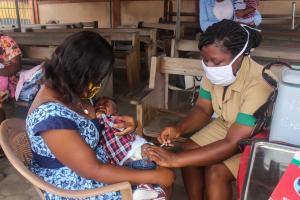Keeping to the universal health coverage path in Kenya
Nairobi – For 60-year-old Gabriel Wahome, it is simple: “universal health coverage was a very good idea,” he says. “We were happy about it.”
Two years ago, the Kenyan government piloted a universal health coverage programme in four of its 47 counties, easing access to health services for millions of people. It has since added more than 200 community health units, with 7700 community health volunteers and over 700 health workers have been recruited. The first year of the pilot phase saw over 1.6 million more hospital visits recorded.
The abolition of all fees at local and secondary level [county referral] health facilities widely expanded access to health services in the four pilot counties that were selected because of a high prevalence of communicable and noncommunicable diseases, high population density, high maternal mortality, and high incidence of road traffic injuries.
“We would go to the hospital even for minor illnesses like a common cold,” says Wahome. “Life changed.”
In an assessment of the pilot phase, the Ministry of Health underscored the need for improvement in a range of areas including accelerated staff recruitment, better links between local and higher-level health facilities, timely funding and supply of medical commodities as well as coordination and management.
The government is now scaling up universal health coverage based on the experiences from the pilot phase and will focus on further reforming its national hospital insurance fund, establishing a mandatory universal health coverage scheme, adopting an essential package of health services, and providing health coverage for an initial 1 million low-income households to be biometrically registered.
“Without improved standards of health, our quest for prosperity and better life for our people would remain hollow,” President Uhuru Kenyatta said in October while launching the biometric registration for the universal health coverage scheme.
Investments made under the first phase of the universal health coverage have helped in the COVID-19 response, says Dr Nelson Muriu, the director of the County Health Department in Nyeri, a central Kenya region which was among the four pilot counties selected for the health coverage scheme.
More health personnel have been hired to help curb the spread of COVID-19, while intensive care units were expanded and more medical equipment procured, Dr Muriu says. The pandemic has exerted a huge strain in health systems across the region and disrupted the provision of essential health services.
The World Health Organization is supporting the government by providing technical assistance in key areas including health financing such as reforming the national hospital insurance fund, developing and using information on financial risk protection as well as supporting the establishing a digital health platform and a national health observatory.
Dr Rudi Eggers, WHO Representative in Kenya, notes that launching universal health coverage at the local level and funding health facilities are the key achievements of the pilot phase.
“We saw people access the services to a much greater extent than they had done before,” says Dr Eggers. “This tells me that there were people that avoided going to health facilities even though they need the services because they feared the financial cost of such a visit.”
Ensuring adequate health workforce, improving skills, health facility financing as well as subsidizing medical costs for low-income households and part-funding health insurance schemes are critical in sustaining universal health coverage, says Dr Eggers.
“With this foundation, Kenya’s UHC [universal health coverage] initiative can expand to ensure access to high-quality health services without financial concern for all Kenyans.”
